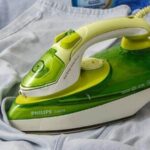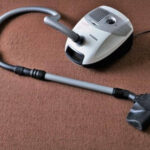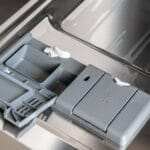Just like real grass, artificial turf requires cleaning and maintenance. And whether fake or real, cleaning a lawn is not a thrilling task. The only motivation that gets most of us down to work is the beauty and splendor that comes with the end results.
But there is an advantage to a fake lawn. Unlike real grass, there is less to worry about. Firstly, it spares you the trouble of mowing, trimming and weeding after every one week or so. Further, if you live in a place like California where water is a scarce resource, you do not need to rake you brain with thirsty grass problems.
But as easy as it sounds, maintaining artificial grass requires some effort. And I constantly come across people wondering whether the little effort is usually a vacuum away.
Can you Vacuum Artificial Grass?
The simple answer is no!
Vacuuming artificial grass with regular vacuums may seem like a good idea but it isn’t. And this boils down to two major reasons.
There are is more than one type of artificial grass but the common one requires infill. Infills vary but the most popular type is sand. Its purpose is to offer structural support.
It holds the grass blades in place so that they can maintain an upright position. Further, it keeps the turf firmly grounded. This prevents it from looking flat or awkward in some other way especially during harsh weather.
Infill is also good if you have heavy traffic on your lawn. It protects the grass from looking flat soon after installation.
Vacuuming turf subjects the infill to powerful suction that pulls it into the vacuum’s bag or dust container. Ideally, this is bad because the whole point is to clean dirt from the lawn and not to remove the infill. Further, it creates unnecessary work of placing back the infill in the grass fibers.
It can also come with additional costs because the need to acquire new infill might arise.
But still, you might wonder whether this applies if your grass does not have infill. Generally speaking it doesn’t. But it leads us to the point number two.
Vacuuming can ruin the quality of your turf. Although this might not happen in the first few sessions of vacuuming, ultimately, routine cleaning will leave you with a problem that is much bigger than mere dirt and dust.
Simply stated, vacuuming loosens the blades of your artificial grass. This is not something to look forward to for obvious reasons. To begin with, the lifespan of your turf shortens significantly. Secondly, the general appearance degrades in a big way. Ultimately, both reasons force you to dig deeper into your pockets prematurely.
If you still prefer to vacuum your artificial grass, there special vacuums that are specifically made for this purpose. Acquiring one can help you keep your grass clean without ruining its quality.
Alternative ways to Clean Artificial Grass
If you only own a regular vacuum, there are other methods that you can use to clean your artificial lawn.
Use a Rake or Broom
Firstly, if the intention is to remove dried leaves, sticks, pet hairs, pinecones and so on, use a rake or broom. A rake heaps this kind of debris faster that you would by picking each piece of waste by hand. The same case applies to a broom.
Once you have heaped up the dirt, use a dust pan to collect it.
But this method may not be of much use if you have pets that urinate and defecate on your turf. An ideal method is one that eliminates the odors that come with these natural processes.
Further, you might also need an alternative approach for tinnier debris.
A turf brush is an excellent choice for tiny debris that is difficult to remove with a rake or broom.
Cleaning Pet Urine and Solid Waste
Firstly, begin by scooping solid waste and throwing it into to the bin.
Follow up by cleaning the turf thoroughly with a garden hose. A pressure washer is a better alternative if the turf is releasing a strong odor.
And instead of using water, you can mix it with vinegar in the ratio of 1:1. Vinegar is a good natural cleaning agent that is also effective at removing pet urine odors.
If the smell does not disappear, the ultimate solution is to invest in an enzymatic odor eliminator. These are the most trusted products for breaking down the bacterial agents that thrive in pet urine.
A reputable brand that I confidently recommend is simple green.
Removing Snow from Turf
Unlike other times when you deal with regular dirt and debris, snow covers your artificial lawn during winter. As much as it is not appropriate to regard it as dirt, it acts as obstruction, preventing you from using your lawn like you ordinarily would.
Ideally, it is best to leave the snow until it melts. However, if you have to get rid of it, avoid using a regular shovel because it can damage the grass permanently.
Frequently Asked Questions
What is the best way to clean artificial grass?
The best way to clean artificial grass depends on the kind of dirt you intend to remove. A rake or brush with stiff brittles or broom are good for removing dried leaves, sticks and similar kind of dirt.
If you intend to remove solid waste, scoop the excess first, then follow up by rinsing the spot with water from a garden hose pipe or pressure washer. You can use water and regular liquid soap if your grass is too dirty. However, an enzymatic cleaner or a solution of water and vinegar are best if you intend to eliminate pet urine odor.
How do you remove debris from artificial grass?
The best way to remove debris is by using a rake or broom. There are rakes that are specifically meant for artificial turf. If you do not find these two reliable, you can explore the market for a turf vacuum.
Can I pour boiling water on artificial grass?
Yes! You can pour boiling water on artificial grass to destroy weeds. Weeds ruins the appearance of your grass but they are easier to pull out sometime after pouring the boiling water.
Does boiling water damage artificial grass?
Boiling water damages weeds growing on your artificial grass but does not damage the turf.
How do I stop my artificial grass from smelling?
Your artificial grass may be smelling because it is new, or because you have pets that urinate and defecate on it. If your grass is new and smelling, it is because of the materials used to make it. Ideally, the smell should fade gradually.
If the smell on your turf is as a result of pet pee, treat it with an enzymatic odor eliminator or a solution of water and vinegar.
Does artificial grass grow?
No! Artificial grass does not grow. However, it is normal to see weeds growing on your fake lawn.
How long will artificial grass last?
Artificial grass can last for up to 20 years. Generally, durability depends on factors such as quality and maintenance.
Can dogs pee on artificial grass?
Dogs, cats and rabbits can pee on artificial grass. They can also poop on it. However, this is not a big problem because there are products to eliminate pee odor.





